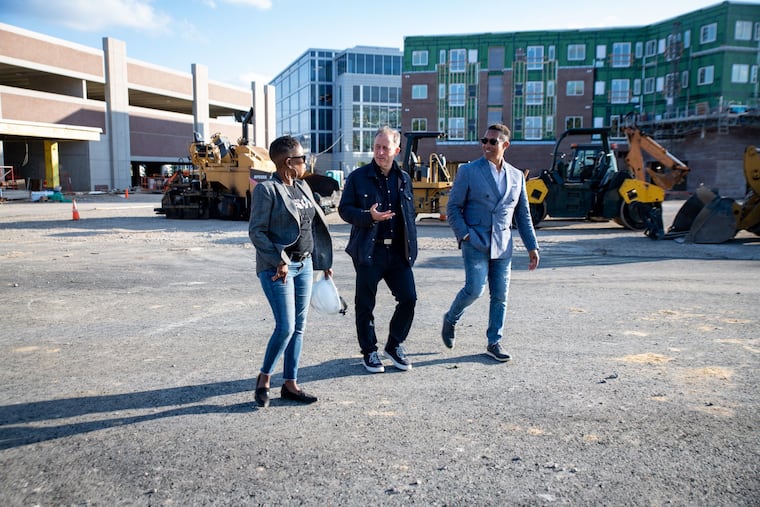Sixers owner invests $10M into Philly’s Mosaic in bid to build firm into Black-owned real estate juggernaut
Josh Harris’ equity-minded investment in Mosaic comes amid an increasing awareness of participation gaps in the commercial real estate industry.

Josh Harris, managing partner of the 76ers, has invested $10 million into Philadelphia-based Mosaic Development Partners in a bid to help the Black-owned firm diversify the real-estate workforce and boost development in disenfranchised communities.
Harris’s investment goal is to create “the largest minority-owned development platform” in the eastern United States, as measured by assets under management, Harris and Mosaic said in a statement ahead of the deal’s formal announcement, planned for Thursday.
Mosaic didn’t disclose the value of its current holdings.
The cash infusion will help the firm staff up to handle bigger projects — including some outside its home turf of Philadelphia — while directly funding elements of some existing projects, such as the ongoing redevelopment of the South Philadelphia Navy Yard, said Mosaic co-founder Leslie Smallwood-Lewis.
Under its deal with Harris, Mosaic will also continue turning to communities that have traditionally been underrepresented in the real estate industry for the architects, consultants, contractors, lawyers and other service providers it works with, Smallwood-Lewis said.
“It’s going to enable us to do more of what we’ve already been doing,” she said. “When we, as the developers, are making those decisions as to who the professional service providers will be in our projects, we’re able to reach out to those who have really not been selected to be parts of teams of these impactful projects.”
Harris, a private-equity executive who owns Harris Blitzer Sports & Entertainment with partner David Blitzer, was traveling Wednesday and unable to comment on the deal with Mosaic, but said in a statement that it aimed to advance “equity, economic opportunity and long-term change for all Philadelphians.
“Mosaic is one of Philadelphia’s most innovative developers and a leader in pioneering a model for community development that truly engages residents, expands local hiring and furthers opportunities for equitable wealth creation,” Harris said. “I am proud to support Mosaic’s ambition to expand their work.”
Lagging racial equity in real estate
Harris’s equity-minded investment in Mosaic comes amid an increasing awareness of how few non-white professionals participate in the commercial real estate industry.
NAIOP, an association of commercial real estate developers, has no demographic data on industry participation but cited a 2013 study showing that almost 78% of senior-level commercial real estate jobs nationally were held by white men, with white women holding the next biggest portion, about 14%.
There have been some efforts to narrow the participation gap.
The city of Philadelphia, for one, introduced an initiative this month called the Minority Developer Program, which aims to provide more equitable access to the city’s development boom by setting aside some public land for purchase by members of historically underrepresented groups.
Separately, a local consortium of Black developers is forming “the Collective” to solicit private capital, while also accepting grants from nonprofits and government. The Collective, which counts Mosaic as a member, aims to raise $100 million initially.
By building relationships with development partners with varied racial and cultural backgrounds to participate in its projects, and by focusing on neighborhoods that have been largely left out of the city’s recent waves of development, Mosaic has long been a participant in this equity-and-diversity drive, said Greg Reaves, Mosaic’s other co-founder.
Among the “minority business enterprises” brought on to work on projects with Mosaic has been the Hispanic-owned Rodriguez Consulting and Moody Nolan, the country’s largest Black-owned architecture firm.
Mosaic’s projects have included the Golaski Labs apartments, in a former medical supply factory near Wayne Junction in Germantown, and the Sharswood Ridge retail and public-housing complex in North Philadelphia, which is being developed in partnership with Shift Capital.
Harris Blitzer Sports & Entertainment was an investor in Sharswood Ridge, separately from Harris’s new agreement with Mosaic. Harris first became acquainted with Mosaic in 2020, when they joined the development team on his ill-fated bid to construct a new basketball arena at Penn’s Landing as part of the remaking of the Delaware River waterfront site.
Mosaic is on a growth track
In July of that year, Mosaic was picked along with Ensemble Real Estate Investments of Long Beach, Calif., to spearhead the next phase of redevelopment at the Navy Yard, a $2.6 billion initiative that’s slated to include the former military base’s first apartments in addition to more labs and offices.
Ensemble has developed the Navy Yard’s Marriott hotel and the Hilton Garden Inn on the Camden waterfront, and its Philadelphia operation is largely led by former executives of since-acquired Liberty Property Trust, which developed both of Comcast Corp.’s Center City high-rises and other major projects.
Such big developers tend to have their own established networks of contractors and other collaborators, which may not include representatives with the varied backgrounds that Mosaic has worked to bring into its fold, Smallwood-Lewis said.
With the Harris investment, Mosaic should be able to build its capacity to work on projects with ever-bigger development groups, which will also have the effect of increasing opportunities its diverse stable of real estate pros, she said.
“We’re forging strong relationships with minority- and women-owned companies,” Smallwood-Lewis said. “Now they are in the mix: They’re getting continual projects from us so they can start to strategize their growth.”